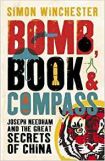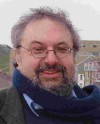Bomb, Book and Compass by Simon Winchester
It is 1943 and a twin engined Douglas C-47 is making its way low over the mountains, using cloud cover to avoid Japanese Zero fighters. It lands right in the centre of China at Chungking - now known as Chongqing in pinyin - into the political and military chaos, which is wartime China. A tall man with spectacles emerges - this is Dr Joseph Terence Montgomery Needham, a brilliant biologist and Cambridge don on an important mission of discovery to help save Chinese universities from the marauding Japanese enemy. In the intense 90-degree heat, he has just arrived from the cool dampness of Gonville and Caius College; his intensive studies begun, on behalf of the Royal Society and the British government, and also which will lead to the remarkable revelations and extensive history, in twenty four volumes and three million words, of Chinese Science and Technology.
| Bomb, Book and Compass by Simon Winchester | |
|
| |
| Category: Biography | |
| Reviewer: George Care | |
| Summary: An excellent biography of the polymathic scholar Joseph Needham and his involvement with the historical development of Chinese Science and Technology. | |
| Buy? Yes | Borrow? Yes |
| Pages: 336 | Date: September 2008 |
| Publisher: Viking | |
| ISBN: 978-0670913787 | |
|
| |
The only son of an eccentric marriage between a Scottish doctor and an erratic and temperamental Irish musician, Needham was educated at Oundle and Cambridge. He was also much influenced by a family friend, the surgeon and zoologist, who pioneered the hysterectomy, Sir Bland-Sutton. Upon gaining his doctorate in 1925 he worked with the great biochemist Frederick (Hoppy) Hopkins in whose labs he was to come across a lively abundance of clever women. During this time, he also met several warm and friendly members of the working classes both whilst in Picardy and also when learning to drive locomotives. This laid the foundation for two lifelong pursuits, pretty ladies and the cause of the proletariat.
His was to be an open marriage and when intelligent, clever and radical Lu Gwei-djen, a brilliant biochemist and embryologist, arrived in Cambridge, Needham was indeed smitten. An intense affair began which was to last some 50 years. Simon Winchester is very amusing on the intellectual climate in Cambridge in the thirties, for Joseph Needham's boundless and eccentric appetite for everything from Christian Socialism, Morris dancing, nudism, as well as his advanced cell research; how through his love for Lu Gwei-djen, he speedily assimilates the Chinese language and characters - partly due to his astounding visual memory, this polymath added to his skills the gentle, subtle art of calligraphy.
Winchester is clear and informative on the prevailing ignorance of the English ruling class about the implications of the Japanese attack on China. Whilst there, the radical Chinese were following such developments as the Spanish Civil War assiduously. Having become a left activist, little escapes Needham's eye, when he arrives in China on his mission to support the science in universities after the attack on Pearl Harbour. Just as importantly he is fascinated by topography and technology. He takes an interest in ancient methods of grafting orange trees, flood control, ancient civilisations and early printed texts. He is sympathetic too, and quite beguiled by the scientific academics with their intriguing defensive improvisations under intense bombardment.
Joseph Needham, reinforced by his linguistic abilities, makes friends with oddballs, explorers and missionaries everywhere. He is forced to adapt to the diplomatic and military situation within the complex geography of China with its towering, teeming cities under Japanese attack. Needham also energetically improvises support for the Chinese against the barbarous enemy. Winchester outlines how Needham still makes time for trips, adventures and explorations. Lengthy and difficult lorry treks are made deep into North West China to investigate rivers and bridges, irrigation schemes and the source of ancient printed texts sought. With a panache that matches his subject, Simon Winchester, shows gentle irony towards the zealous scholar of Gonville and Caius, the man who was, to help after war reconstruction and to put the S into UNESCO.
Upon his return, Needham's left politics worried the CIA based in Paris and yet these same leanings led to Julian Huxley's support in the peacemaking. Like some impressive mandarin he was awarded with the spoils of war. He received the huge oak desk, with gold anchors in the corner that had belonged to a prominent German admiral. This was a magnificent surface on which to begin his immense task of attempting to solve the problem with which he had become obsessed. This was the famous Needham question.
What was it that inhibited development in China after 1500? Was this connected to the language and the complex ideographs? Was it because there was a lack of competition over such a large area whereas the close packed European states were forced into conflicting enterprise which drove expansion of trade and development? Was it not the case that it was science rather than technology, inhibited by a lack of empirical testing? Galileo's experiments or Newton's work and mathematics, especially Euclidean geometry, was unavailable to Chinese science. There was the restrictive influence of a rigid civil service selected by competitive examination but no mercantile middle class.
The debate on these issues and the need to examine these matters in a framework which is not just Western, that continues Needham's challenge and flows forth from his magnificent collection of information. Simon Winchester is interested in conveying the eccentricity and the excitement of Needham's life and examines another interesting question concerning his response to the victory of Communism in China. In particular there is the matter which almost destroyed his career in 1952-3 at the height of the Cold War, when Needham gave support, chairing an international enquiry into the use of biological weapons in Korea by American forces. It appears that he was hoodwinked by Russian agents. At the same time Winchester mentions that the whole story of what exactly the US troops may have been doing has not yet fully emerged. Altogether Needham maintained his integrity despite a certain naivety. This is a rollicking read and a book which keeps you interested and asking questions about the many magnificent facets to this man and his involvement in the vast country which is China today.
I'd like to thank the publishers for sending a copy to The Bookbag.
If this book appeals then you might also enjoy Return to the Middle Kingdom by Yuan-Tsung Chen - but Winchester is far more readable.
Please share on: ![]() Facebook,
Facebook, ![]() Twitter and
Twitter and
![]() Instagram
Instagram
![]() You can read more book reviews or buy Bomb, Book and Compass by Simon Winchester at Amazon.co.uk Amazon currently charges £2.99 for standard delivery for orders under £20, over which delivery is free.
You can read more book reviews or buy Bomb, Book and Compass by Simon Winchester at Amazon.co.uk Amazon currently charges £2.99 for standard delivery for orders under £20, over which delivery is free.
![]() You can read more book reviews or buy Bomb, Book and Compass by Simon Winchester at Amazon.com.
You can read more book reviews or buy Bomb, Book and Compass by Simon Winchester at Amazon.com.
Comments
Like to comment on this review?
Just send us an email and we'll put the best up on the site.

